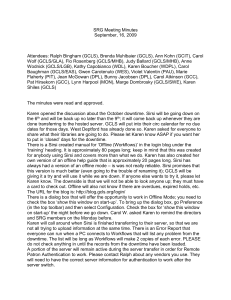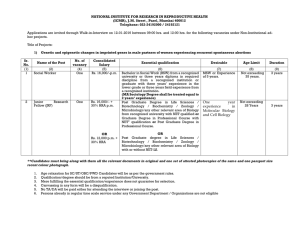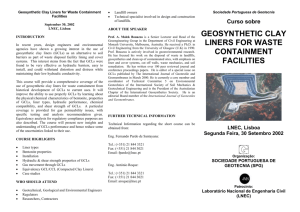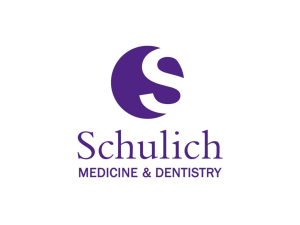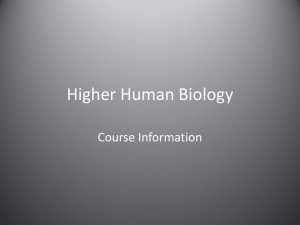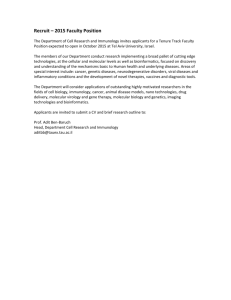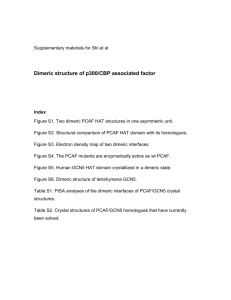GEMS Program
advertisement
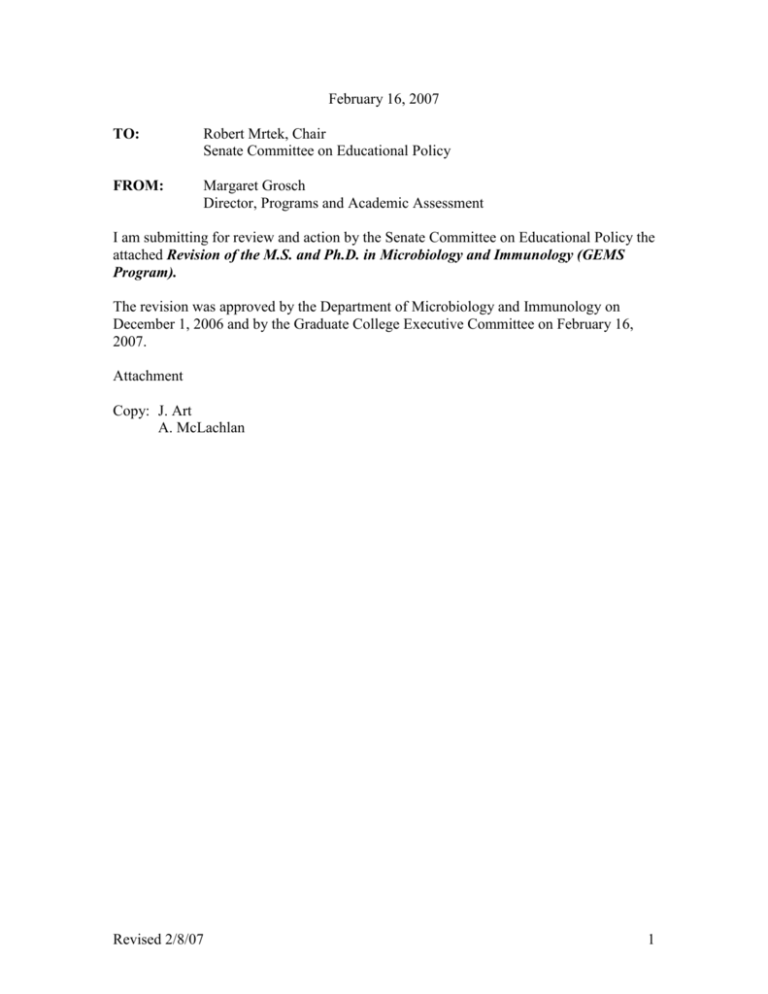
February 16, 2007 TO: Robert Mrtek, Chair Senate Committee on Educational Policy FROM: Margaret Grosch Director, Programs and Academic Assessment I am submitting for review and action by the Senate Committee on Educational Policy the attached Revision of the M.S. and Ph.D. in Microbiology and Immunology (GEMS Program). The revision was approved by the Department of Microbiology and Immunology on December 1, 2006 and by the Graduate College Executive Committee on February 16, 2007. Attachment Copy: J. Art A. McLachlan Revised 2/8/07 1 Title: Revision of the M.S. and Ph.D. in Microbiology and Immunology (GEMS Program) Sponsor: Department of Microbiology and Immunology, College of Medicine Description: Three years ago, the five basic science departments in the College of Medicine created the GEMS, Graduate Education in the Medical Sciences, program. The GEMS program offers students integrated training in the biomedical sciences At its inception, there were three courses required across all departments: GCLS 501 (Biochemistry); GCLS 502 (Molecular Biology); and GCLS 503 (Cell and Integrative Physiology). This year, the Department of Physiology and Biophysics has developed a three credit physiology course, GCLS 500 (Physiology), as part of the GEMS offering. Dean Colley, Interim Dean for Research in the COM, proposed, and the Department Heads accepted, a slight reconfiguration of the GEMS program so that the four Fall courses (the new course GCLS 500, as well as the existing courses GCLS 501, 502, and 503) be designated as ‘Selectives,’, and that in general, all incoming students would be required to take or show proficiency in three of the four selectives during their first two years of study. The 503 course will be renamed Cell Biology to reflect its more restricted focus. A number of the Integrative Physiology lectures will be removed, and the corresponding credit will be reduced from four to three hours. In the section on required courses for the MS and PhD in Microbiology and Immunology, it previously read: All students must take or show proficiency in GCLS 501, 502, 503, 504, 505, 510 and 511. This has now been changed to: All students must take or show proficiency in three of four selectives from GCLS 500, 501, 502, 503. They must also take or show proficiency in GCLS 504, 505, 510, and 511. Additionally, the PhD in Microbiology and Immunology is adding GCLS 506 to list of required courses. The total credit hours required for the MS (32) and PHD (96) remain the same. Justification: Revised 2/8/07 In three years the Graduate Education in the Medical Sciences program has grown from a common core for students in the COM basic science departments, to a resource for the entire campus. Based on this experience the members of the program have realized that an expansion of the program to include a more complete Physiology course would benefit not only COM 2 students, but those in other units as well. Moreover, the addition of courses such as the new Physiology course will facilitate the development of translational and interdisciplinary programs across campus. We anticipate that additional courses to be developed in the future will allow students in a variety of programs to benefit from an appropriate subset of the GEMS program offerings. To match the courses to the specific program and the previous training of a student, the strategic decision was made to change the requirement that all students take the same three courses, to one in which each student is required to take an appropriate subset of the offered core. Currently, with the addition of the Physiology course, students will be able to select three of four courses. Each student is expected to select an appropriate course sequence in consultation with the Graduate Studies Committee and the Director of Graduate Studies in their program. GCLS 506 is being added to the PhD program because it is the mechanism by which students rotate through labs in the GEMS program. Through this course students conduct research experiences and settle on an advisor with whom to do their dissertation work. Catalog Statement: See attached. Minority Impact Statement: None. Budgetary and Staff Implications: None. Library Resource Implications: None Space Implications: No change Unit (e.g. department) approval date: The changes proposed by Dean Colley were accepted unanimously by the five Department Heads at the College of Medicine Basic Science Heads meeting on December 1, 2006. College (educational policy committee, faculty) approval dates: Revised 2/8/07 Basic science program changes are reviewed by the Graduate College without prior review by the College of Medicine. 3 Contact Person: Jonathan Art, Ph.D. Associate Dean of the Graduate College Proposed Effective Date: Fall, 2007 Catalog Statement: Current Format Microbiology & Immunology Proposed Changes Mailing Address: Department of Microbiology and Immunology (MC 790) 835 South Wolcott Avenue Chicago, IL 60612-7344 Same. Campus Location: E-704 MSB Same Program Codes: 20FS1468MS (MS); 20FS1468PHD (PhD) Same. Telephone: (312) 996-9477 E-mail: mimi@uic.edu Web Site: http://www.uic.edu/depts/mcmi/index2.html Head of the Department: Bellur Prabhakar Same. Director of Graduate Studies: William Hendrickson Director of Graduate Studies: Alan McLachlan The Department of Microbiology and Immunology offers work leading to the Master of Science and the Doctor of Philosophy degrees and participates in the MD/PhD joint degree program (see the MD/PhD section of the catalog for more information). The department carries out basic research in the areas of immunology, virology, and microbial molecular biology. Research leading to a graduate degree is available in the general areas of molecular, cellular, and tumor immunology; molecular biology and genetics of procaryotes; and molecular biology of eucaryotic cells and viruses. Same. Admission Requirements Revised 2/8/07 4 In addition to the Graduate College minimum requirements, applicants must meet the following program requirements: Master of Science and Doctor of Philosophy Baccalaureate Field No restrictions. Applicants must have a solid background in biology and inorganic and organic chemistry, and at least one year of physics and mathematics. Other Requirements At least 2.75/4.00 for the final 60 semester hours (90 quarter hours) of undergraduate study. Preference is given to those applicants who have a GPA greater than 3.00. Tests Required GRE General. This test should be taken prior to submission of the formal application. Preference is given to applicants with a combined verbal and quantitative score above 1200, and analytical writing above 4.0. Minimum TOEFL Score 550 (paper-based); 213 (computer-based); 80, with subscores of Reading 19, Listening 17, Speaking 20, and Writing 21 (new Internet-based TOEFL). Letters of Recommendation Required. Personal Statement Required. Other Requirements Preference is given to applicants with a documented record of research accomplishment who intend to complete the doctoral program. Degree Requirements In addition to the Graduate College minimum requirements, students must meet the following program requirements: Master of Science Same. Minimum Semester Hours Required 34. Same. Course Work All students must take or show proficiency GCLS 501, 502, 503, 504, 505, 510 & 511. Course Work All students must take or show proficiency in three of four courses from GCLS 500, 501, 502, 503. They must also take or show proficiency in GCLS 504, 505, 510 and 511. Revised 2/8/07 5 Comprehensive Examination None. Same. Thesis, Project, or Course-Work-Only Options Thesis required. No other options are available. Students must register in MIM 598 for 9 semester hours. Same. Other Requirements None. Same. Doctor of Philosophy Minimum Semester Hours Required 96 from the baccalaureate. Same. Course Work Required Courses: Nine hours of MIM 455. All students must take or show proficiency in GCLS 501, 502, 503, 504, 505, 510, and 511. Course Work Required Courses: Nine hours of MIM 455. All students must take or show proficiency in three of four courses from GCLS 500, 501, 502, 503. They must also take or show proficiency in GCLS 504, 505, 506, 510 and 511. In addition students must take MIM 594 for 1 hour, and 2 additional 500-level courses, MIM 551 and MIM 553 are recommended. Four additional hours of MIM 595 and 52 semester hours of MIM 599 are required Same. Preliminary Examination: required. Same. Dissertation Required. Students must earn at least 52 hours in MIM 599. Same. Other Requirements During the second year of graduate study, students must conduct a satisfactory oral defense of a written research proposal that is different from their thesis subject. All graduate students, regardless of their means of financial support, must participate in the teaching programs of the department for one semester of each academic year. This requirement includes experiences in laboratory instruction, lecturing, and audiovisual presentations. Same Revised 2/8/07 6 Course Descriptions: GCLS 500 Physiology. 3 hours. (new course) Lectures in human physiology. Emphasis is on an integrated approach to systems physiology. Restricted to students enrolled in a graduate program offered through the Colleges of Medicine, Pharmacy or Applied Health Sciences or in the Departments of Bioengineering or Biological Sciences, or consent of the instructor. Prerequisites: mathematics, undergraduate physics, organic chemistry, or consent of the instructor. GCLS 501 Biochemistry 3 hours. Fundamental properties of biomacromolecules, the thermodynamics underlying basic biochemical processes and the properties of enzymes, including the kinetics of operation, and regulation, illustrated with important examples. Restricted to students enrolled in a graduate program offered through the Colleges of Medicine or Pharmacy or the departments of Bioengineering or Biological Sciences or consent of the instructor. GCLS 502 Molecular Biology 3 hours. Core molecular biology course covering basic principles of gene expression, genome replication and molecular interactions important to biological processes in prokaryotes and eukaryotes. Restricted to students enrolled in a graduate program offered through the Colleges of Medicine or Pharmacy or the departments of Bioengineering or Biological Sciences or consent of the instructor. GCLS 503 Cell Biology. 3 hours. (revised title, credit hours) Advanced course on fundamental aspects of cell biology; basic concepts will be integrated with key examples of human physiology which span gene, protein, cell, tissue, organ and whole body function. Credit is not given for GCLS 503 if the student has credit in BCHE 561 or ANAT 585 or MIM 585 or PHYB 585. Restricted to students enrolled in a graduate program offered through the Colleges of Medicine, Pharmacy or Applied Health Sciences, or the departments of Bioengineering or Biological Sciences or consent of the instructor. GCLS 506 GEMS Research Rotation 2 TO 5 hours. Research rotation course in which first year students from the GEMS program will undertake research projects in laboratories affiliated with this program. Satisfactory/Unsatisfactory grading only. May be repeated. Animals used in instruction. Prerequisite(s): Open only to Ph.D. degree students. Revised 2/8/07 7
